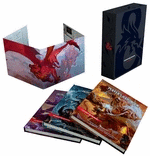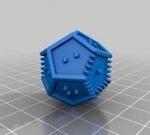Accessibility Recommendations
Not every TRPG is accessible for all players, but libraries are encouraged to adapt various elements of gameplay to ensure that library TRPG collections and programming are enjoyable and accessible for all.
Rulebooks & Supplementary Materials

Some publishers only publish their rulebooks and adventures in hard copy. Players with visual impairments may rely on learning game rules from fellow players; however, if accessible versions of PDFs exist, players may be able to use screen-reading software to access TRPG materials.
A web resource, called Bits and Mortar, exists which provides access to free digital PDF downloads of previously purchased physical copies of TRPGs. These PDFs may be circulated to users with print and visual disabilities.
The Character Sheet
Legally blind players have also developed character sheets with large print and use hand-held electronic magnifiers to enhance text.
Alternatively, digital pre-made character sheets may be downloaded from many gaming websites.
Kirsty, a legally blind writer and player of Dungeons & Dragons, developed her own character sheet using Excel, which she reads using a screen reader. The custom Excel character sheet allows Kirsty to keep track of her character’s health points and spell slots, change items and figures in real time, and take notes.
Libraries can accommodate players who are visually impaired by providing access to hand-held electronic magnifiers, large-print character sheets, and screen-reading software.
Game Accessories
Most standard polyhedral dice are difficult to read for people with visual impairments.
Some TRPG players with visual disabilities suggest using large, high contrast dice or a dice rolling application on a smartphone, tablet, or computer.

Several game websites geared towards accessibility sell 3D-printed braille dice. Those websites occasionally provide stereolithography (.STL) files for players to 3D-print their own dice.
Having a miniature collection on-hand is useful to help players to visualize characters, enemies, and NPCs.
Theatre of the Mind
For those with visual impairments, commonly used tools, such as maps, cards, and diagrams are largely inaccessible.
GMs and players are encouraged to give detailed verbal descriptions of maps and combat. These extra descriptions are great for both visually impaired and sighted players as they work to stimulate everyone’s imaginations.
